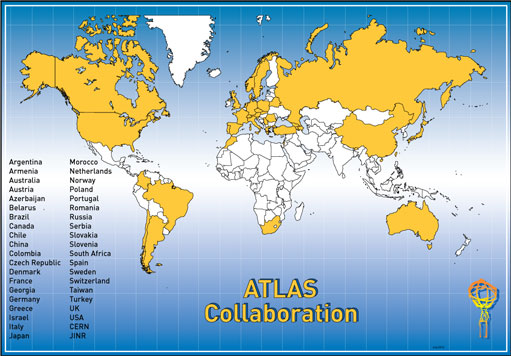
ATLAS e-News
23 February 2011
South Africa joins ATLAS!
27 July 2010

ATLAS presence around the world now spreads out to include South Africa.
Vuvuzelas loudly cheered at the ATLAS Collaboration Board meeting on July 2nd when South Africa officially became part of ATLAS! Two Institutes, University of Johannesburg (UJ) and University of the Witwatersrand (WITS), form the new cluster. The South African Cluster was unanimously admitted by the Collaboration Board with strong support from the ATLAS management, bringing the total number of ATLAS institutions to 174.
Since both universities are located in Johannesburg, the WITS and UJ groups will naturally collaborate. According to Fabiola Gianotti, they have already demonstrated their ability to work closely together as evidenced by their coherent presentation of their Expression of Interest (EoI) to the ATLAS Collaboration Board.
Both groups are enjoying not only a hugely supported endeavor, but auspicious beginnings as well. Each Institute has already attained half of the funding for the member fee from their respective universities, and the other half has been promised to them by the South African Department of Science and Technology. Furthermore, there “… has been an increase in the formation of large-scale collaborations within South Africa which have attracted substantial group funding,” Simon Connell and Trevor Vickey stated in their EoI letter. Simon and Trevor are respectively the heads of the UJ and WITS groups.
Within the new South African Cluster several university positions have either been recently opened or recently filled, in accordance with their ample growth needs. The cluster will focus on attracting post docs and graduate students, “... with a view to excellence in science, human capacity development and innovation,” wrote Simon and Trevor in their EoI. The University of Cape Town has already shown interest in joining the South African Cluster as well, and will once Andrew Hamilton takes up his appointment there next year. Peter Jenni will continue to further this collaboration when he travels to Cape Town, Johannesburg and Pretoria in August to help finalise and consolidate the cluster plans.
ATLAS's presence is a significant step along a scientific path that South Africans have been paving for quite some time. South Africa's contributions to the scientific community are many and range from the first successful heart transplant to the discovery of the first neutrino in nature (in the South African mine-based laboratory EPRM).
CERN first signed a Cooperation Agreement with South Africa in 1992. Following investigations of radiation from lepton incidence on crystals with participation in the NA43, NA59 and NA63 experiments, a South African team joined the ALICE experiment in early 2000.
Areas of particular interest to the new ATLAS cluster include GRID development, research in semiconductor tracking, hadronic tau identification, and searches for the Higgs boson and exotic particles.
Adding to the GRID capacity is a definite focus of the South African Cluster. Tests will be conducted soon that are expected to lead to ATLAS Tier-3 status. A formal collaboration agreement is being drafted between UJ and WITS to co-develop a much larger computing cluster to eventually establish a Tier-2 site in South Africa.
The addition of the South African Cluster to the ATLAS Collaboration resulted from substantial efforts made by Simon and Trevor, of course, but also many ATLAS members: Kétévi Assamagan, Peter Jenni, Jonathan Butterworth, Fabiola Gianotti, Howard Gordon, Michael Tuts, and Anthony Weidberg.
Simon initiated the successful forming of the ATLAS activities for the Department of Physics at UJ, the broader South African physics community and the South African Government. With Kétévi's support, they have worked diligently to create the ATLAS group, and to obtain substantial support from the university. Trevor has played a crucial role in the build-up of the new LHC activities for the School of Physics at WITS. In January 2010, Trevor started a Senior Lecturer position there inclusive of the special privilege and substantial provision for such an effort to be made.
Since the official South Africa-CERN collaboration launch event in Cape Town and Johannesburg in December 2008, Peter Jenni has been representing ATLAS in discussions with the Department of Science and Technology and in meetings with both universities' officials.
ATLAS is pleased to welcome South Africa and wishes the best to the two new groups.
 Sarah McGovernATLAS e-News
|